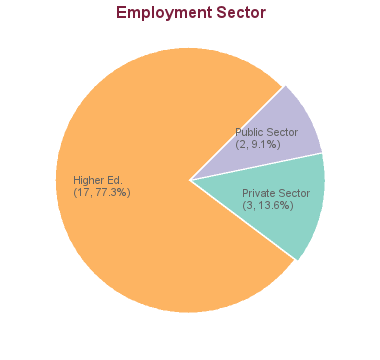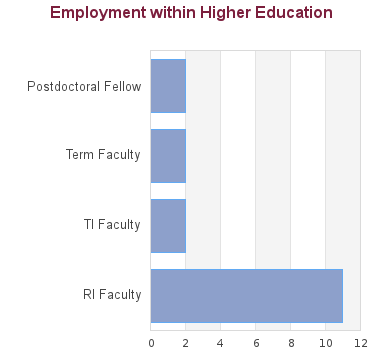
Craig Bateman
Job Title
Copy editor, legal researcher, and writing consultant
Employer
Self employed

Review details about the recently announced changes to study and work permits that apply to master’s and doctoral degree students. Read more
The PhD in Law is designed to provide advanced training for outstanding graduate students who have already obtained a Master of Laws (LLM) degree or its equivalent. The PhD is a research-intensive degree that prepares graduates for opportunities in law teaching, legal research, policy development, public and governmental service, and the practice of law.
The degree requirements include course work, comprehensive exams, a dissertation proposal and defence, a dissertation, and an oral dissertation exam. Working closely with a supervising faculty member, a student in the PhD program is expected to produce a book-length piece of original legal scholarship and of publishable quality.
The PhD provides an opportunity for focused study in a chosen field of law. It does not, of itself, qualify a holder for entry to the legal profession in British Columbia or any other certification for legal practice.
The Faculty of Graduate and Postdoctoral Studies establishes the minimum admission requirements common to all applicants, usually a minimum overall average in the B+ range (76% at UBC). The graduate program that you are applying to may have additional requirements. Please review the specific requirements for applicants with credentials from institutions in:
Each program may set higher academic minimum requirements. Please review the program website carefully to understand the program requirements. Meeting the minimum requirements does not guarantee admission as it is a competitive process.
Applicants from a university outside Canada in which English is not the primary language of instruction must provide results of an English language proficiency examination as part of their application. Tests must have been taken within the last 24 months at the time of submission of your application.
Minimum requirements for the two most common English language proficiency tests to apply to this program are listed below:
Overall score requirement: 100
Reading
25
Writing
25
Speaking
25
Listening
25
Overall score requirement: 7.0
Reading
7.0
Writing
7.0
Speaking
7.0
Listening
7.0
Some programs require additional test scores such as the Graduate Record Examination (GRE) or the Graduate Management Test (GMAT). The requirements for this program are:
The GRE is not required.
Completion of either an LLB or JD and a Masters degree.
Additionally to the required documents please submit: C.V. or resume Dissertation Proposal: PhD degrees in the Allard School of Law at UBC are dissertation-based degrees involving original research. Dissertation (PhD) proposals form an important part of the admissions process and help to guide the assignment of supervisors and supervisory committees. A proposal should outline a research project that could reasonably lead to a dissertation that makes an original scholarly contribution in the chosen field of legal study. The PhD dissertation proposal is approximately 10 pages (2,500 words), excluding bibliography. Clarity of expression is important. Please upload your thesis proposal under "Writing Sample". List of possible thesis supervisors: All applicants must submit a list indicating your first and second choice for a thesis supervisor, this list should be uploaded to your application form. There is no need to secure a thesis supervisor nor is it is necessary to contact potential thesis supervisors prior to submission of an application as many faculty members prefer that applications are referred by the Graduate Committee for their review.
All applicants have to submit transcripts from all past post-secondary study. Document submission requirements depend on whether your institution of study is within Canada or outside of Canada.
A minimum of three references are required for application to graduate programs at UBC. References should be requested from individuals who are prepared to provide a report on your academic ability and qualifications.
Many programs require a statement of interest, sometimes called a "statement of intent", "description of research interests" or something similar.
Students in research-based programs usually require a faculty member to function as their thesis supervisor. Please follow the instructions provided by each program whether applicants should contact faculty members.
Permanent Residents of Canada must provide a clear photocopy of both sides of the Permanent Resident card.
All applicants must complete an online application form and pay the application fee to be considered for admission to UBC.
Allard Hall, the home of the Peter A. Allard School of Law, was opened in 2011. The latest technology connects the Faculty with campuses, courthouses and offices around the world, and a new, state-of-the-art UBC Law Library serves as a vital academic hub for students and the legal community. Natural light, contemporary classroom designs, expanded student service spaces, a student forum space at the centre of the building, and new research spaces are all part of the new facility. The Law Library has a research collection of approximately 225,000 volumes.
| Fees | Canadian Citizen / Permanent Resident / Refugee / Diplomat | International |
|---|---|---|
| Application Fee | $116.25 | $168.25 |
| Tuition * | ||
| Installments per year | 3 | 3 |
| Tuition per installment | $1,875.34 | $3,294.66 |
| Tuition per year (plus annual increase, usually 2%-5%) | $5,626.02 | $9,883.98 |
| Int. Tuition Award (ITA) per year (if eligible) | $3,200.00 (-) | |
| Other Fees and Costs | ||
| Student Fees (yearly) | $1,144.10 (approx.) | |
| Costs of living | Estimate your costs of living with our interactive tool in order to start developing a financial plan for your graduate studies. | |
Applicants to UBC have access to a variety of funding options, including merit-based (i.e. based on your academic performance) and need-based (i.e. based on your financial situation) opportunities.
From September 2024 all full-time students in UBC-Vancouver PhD programs will be provided with a funding package of at least $24,000 for each of the first four years of their PhD. The funding package may consist of any combination of internal or external awards, teaching-related work, research assistantships, and graduate academic assistantships. Please note that many graduate programs provide funding packages that are substantially greater than $24,000 per year. Please check with your prospective graduate program for specific details of the funding provided to its PhD students.
All applicants are encouraged to review the awards listing to identify potential opportunities to fund their graduate education. The database lists merit-based scholarships and awards and allows for filtering by various criteria, such as domestic vs. international or degree level.
Many professors are able to provide Research Assistantships (GRA) from their research grants to support full-time graduate students studying under their supervision. The duties constitute part of the student's graduate degree requirements. A Graduate Research Assistantship is considered a form of fellowship for a period of graduate study and is therefore not covered by a collective agreement. Stipends vary widely, and are dependent on the field of study and the type of research grant from which the assistantship is being funded.
Graduate programs may have Teaching Assistantships available for registered full-time graduate students. Full teaching assistantships involve 12 hours work per week in preparation, lecturing, or laboratory instruction although many graduate programs offer partial TA appointments at less than 12 hours per week. Teaching assistantship rates are set by collective bargaining between the University and the Teaching Assistants' Union.
Academic Assistantships are employment opportunities to perform work that is relevant to the university or to an individual faculty member, but not to support the student’s graduate research and thesis. Wages are considered regular earnings and when paid monthly, include vacation pay.
Canadian and US applicants may qualify for governmental loans to finance their studies. Please review eligibility and types of loans.
All students may be able to access private sector or bank loans.
Many foreign governments provide support to their citizens in pursuing education abroad. International applicants should check the various governmental resources in their home country, such as the Department of Education, for available scholarships.
The possibility to pursue work to supplement income may depend on the demands the program has on students. It should be carefully weighed if work leads to prolonged program durations or whether work placements can be meaningfully embedded into a program.
International students enrolled as full-time students with a valid study permit can work on campus for unlimited hours and work off-campus for no more than 24 hours a week during academic sessions.
A good starting point to explore student jobs is the UBC Work Learn program or a Co-Op placement.
Students with taxable income in Canada may be able to claim federal or provincial tax credits.
Canadian residents with RRSP accounts may be able to use the Lifelong Learning Plan (LLP) which allows students to withdraw amounts from their registered retirement savings plan (RRSPs) to finance full-time training or education for themselves or their partner.
Please review Filing taxes in Canada on the student services website for more information.
Applicants have access to the cost estimator to develop a financial plan that takes into account various income sources and expenses.
24 students graduated between 2005 and 2013: 1 is in a non-salaried situation; for 1 we have no data (based on research conducted between Feb-May 2016). For the remaining 22 graduates:


These statistics show data for the Doctor of Philosophy in Law (PhD). Data are separated for each degree program combination. You may view data for other degree options in the respective program profile.
| 2023 | 2022 | 2021 | 2020 | 2019 | |
|---|---|---|---|---|---|
| Applications | 54 | 57 | 72 | 41 | 63 |
| Offers | 7 | 6 | 7 | 7 | 7 |
| New Registrations | 3 | 5 | 7 | 5 | 7 |
| Total Enrolment | 40 | 40 | 40 | 41 | 40 |
Students in research-based programs usually require a faculty member to function as their thesis supervisor. Please follow the instructions provided by each program whether applicants should contact faculty members.
This list shows faculty members with full supervisory privileges who are affiliated with this program. It is not a comprehensive list of all potential supervisors as faculty from other programs or faculty members without full supervisory privileges can request approvals to supervise graduate students in this program.
| Year | Citation |
|---|---|
| 2021 | Dr. Nickason examines Canada's efforts to give effect to First Nations' rights of self-determination and self-government. She demonstrates that cultural differences, in the ways First Nations and settler societies conceive of legitimacy, have undermined our capacity to negotiate new arrangements to give effect to these rights. |
| 2020 | Dr. Pilliar developed a new person-centered approach to understand and remedy access to justice problems. Drawing on analyses of the legal services landscape, interview research with people who have had access to justice problems, and data on how lawyers do their work, Dr. Pilliar proposes four tangible steps to improve access to justice in Canada. |
| 2020 | Dr. Yorgun studied ostracized populations, understudied in refugee law, conducting novel interviews in South Africa. Dr. Yorgun's research unmasked a bias in refugee law which predominantly focuses on the asylum systems of Western states. She demonstrates this must be overcome to better understand some of the most vulnerable, least mobile refugees. |
| 2019 | Dr. Pauer studied carbon tariffs, an environmental policy recommended by many experts but rarely used in practice. Using interviews and case studies in Europe and the USA, he explained the challenges of adopting and implementing this policy. His research contributes to the development of effective government action to address climate change. |
| 2019 | Dr. Naef studied the challenges of regulating multinational corporations operating in fragile states. He argued that home states must take steps to control their corporate citizens abroad and showed how traditional readings of international law permit them to avoid doing so. His proposed solution lies in reconsidering customary international law. |
| 2019 | Dr. Liu examined the social and environmental performance of Chinese state-owned companies in Kenya. Findings revealed the promises and limitations of China's state-centric corporate social responsibility approach to shape Chinese companies' behaviour overseas. This research contributes to the regulation of sustainable investment in Africa and beyond. |
| 2019 | Dr. Mundorff used a wide array of historical materials and legal documents to examine the role played by the concept of "culture" in the original meaning of the Genocide Convention. He argued that current interpretations of the Genocide Convention, which exclude considerations of culture, are legally and historically untenable. |
| 2019 | Dr. Bazilli interviewed global women's activists on how transnational feminist movements use international human rights law. Her research illustrates how autonomous women's organizations address violence against women and other rights issues. Her research will be used by feminist activists in the ongoing struggle for gender equality. |
| 2018 | Dr. Prebble studied criminal offenses that overlap with one another, asking when that overlap contributes to the problem of there being too much criminal law. Using gendered violence case studies, she found that some specific criminal offences are justified because they give a name to distinct gendered harms that would otherwise not be fully recongised by the criminal law. |
| 2018 | Dr. Olyaei employed a feminist legal lens to assess the overemphasis on law and legal reform to realize gender justice. She argued that feminist strategies should critically situate themselves in specific sociopolitical contexts, concluding that feminist theories of global south are vitally important for directing the future of Iranian feminist activism. |
Departments/Programs may update graduate degree program details through the Faculty & Staff portal. To update contact details for application inquiries, please use this form.

Great academic programs, great location: the distinct seasons and mild climate are among the reasons why graduate students choose to study here -- from the autumn leaves to cherry blossoms, witness the many colours Vancouver has to offer.